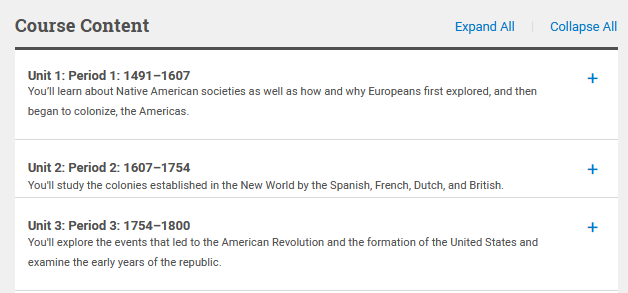ESM Welcomes College MatchPoint to the Team! Learn More

It’s April, and that means it is officially AP season! Your class has officially wrapped up the overview of the material (or is, hopefully, at least close to doing so), and it’s time to start beginning explicit preparation for your AP test!
First, a quick note: this article will cover general tips that will help students preparing for any and all AP exams. I will be using the AP US History test as an example, but they will work for any AP test!
Visit the Course Website
So, where to begin? The College Board AP website, of course! Navigate to the page of your course(s), and you should find a ton of useful information here. For example, each page will have a general “content overview” section that will outline the overall content of the course. Here is the one for AP US History:

This is a great starting point, as it is a “map” you can use to help navigate everything you need to review. Scrolling further down the page, you should find additional resources for the class, including the “Course and Exam Description”. Put together, these resources will give you a great starting point for understanding the overall structure of the class and what you’ll be expected to know for the AP Exam.
Content Review and Study Resources
Your next step is to start full content review! I would recommend everyone review at least all of the material from Semester 1, but it is generally a good idea to review Semester 2 material as well. Here’s the #1 rule for content review: Do NOT use your textbook! The textbook is a comprehensive, extremely dense book designed to cover every single point of the class. As I’m sure you're aware, that makes them very difficult and time-consuming to read. It’s time for something new!
Instead, “Third Party” review books are generally the best place to start, as they are readily available on Amazon for around $20, and they’ll concisely cover all of the major topics you need to have mastered. I tend to prefer Barron's books, but the best book will absolutely vary with the class and person. (For APUSH, the AMSCO book is far and away the best one. The only downside is that it doesn’t provide an answer key for its questions, although that can be found with some astute Google searching.) Ultimately, I don’t think which one you choose matters too much, as long as you have one!
Next up is Khan Academy: I would use this to watch videos on any concepts from the book that you’re still struggling with, and for extra practice on additional concepts. Some classes also have practice available on my AP, which I would definitely recommend if it is available. The combination of a prep book and Khan Academy/My AP should suffice for most students and classes, but there are certainly many more resources out there (Youtube channels can be a great resource)! Read through your book and practice until you feel comfortable with all of the major concepts.
Mastering the Test Format
Once you’ve finished the content review, it’s time to learn the format of the AP test itself. Some tests will be strictly content-based, meaning as long as you know the content you’ll be good to go. (AP Psych, I’m looking at you!)
That said, for most classes you’ll want to make sure you are prepared for the test questions themselves. AP US History, for example, has two essay questions, and it’s imperative that students preparing for that test know the rubrics for the essays inside and out. Anyways, most tests can generally be divided into two portions: “Multiple Choice” and “Free Response”, and you’ll want to make sure you’re ready for both parts.
Multiple Choice
Preparing for multiple choice can be difficult, as it can be hard to find practice material since the College Board doesn’t release much of it. It’s pretty much just My AP and maybe one or two practice tests. You can find these by searching “AP Class Name practice test pdf” on Google. Here's the search for APUSH, which turns up the only practice test available online. If you can’t find one online, make sure your prep book has a couple of them. Take the test, and use it to both identify areas where you need further review and get used to the format of the multiple choice questions.
Free Response
Free Response is generally much easier to prepare for, as College Board posts the FRQs from recent years online. Make sure to take advantage of that! Just type “AP Class Name FRQ” and they’ll come up. Here's the ones for APUSH. These are fantastic resources, as CB not only posts the questions, but also scoring guidelines and sample responses. Make sure you work through these and know them inside and out.
After that, it’s simply a question of repetition and practice until you feel ready to go! If possible, I would absolutely recommend taking a full mock test as final prep heading into your official exam. Good luck!